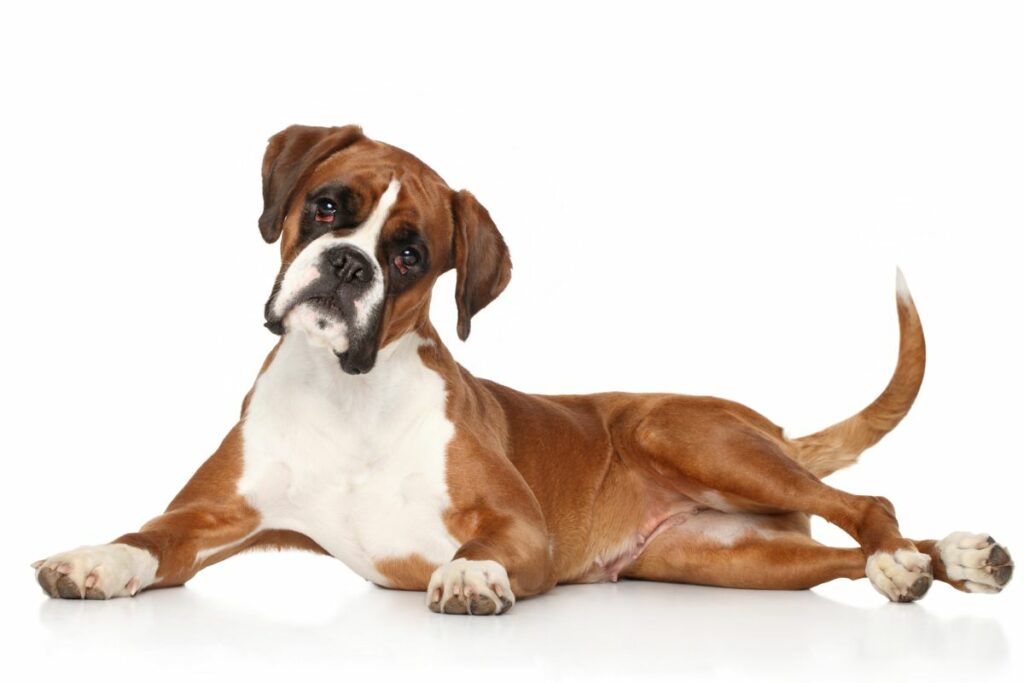From mini pigs to mini donkeys, we just seem to love everything mini. And, it’s no different when it comes to mini dog breeds. Although many small dog breeds already exist, mini versions of larger dog breeds are becoming increasingly popular not only in the United States, but also in the Netherlands.
One mini dog breed in particular is seeing a huge increase in popularity: the Mini Boxer. Boxers are known for their loyalty and playfulness. They love to be close to their owner and are also a great family dog. Want to learn more about this popular mini dog breed? Then read this article to learn more!
The history: a mix of the Boston Terrier & the Boxer
The Mini Boxer is a fairly new mix of the Boston Terrier and the Boxer. Although the date and place of origin is unknown, this dog breed is becoming increasingly popular. More breed combinations are being used in addition to the Boston Terrier and the Boxer:
- The Pug and the Rat Terrier
- The Pug and the Fox Terrier
- The Pug and the Boston Terrier
The Boston Terrier and Boxer combination is the most commonly used breed combination. To get more clarity on this mix, we must first go back to the ancestors.
The ancestors of the Mini Boxer
The Boston Terrier is a breed that has been known in its history by other names: the American Gentleman, the Boston Bull or simply the Boston. This breed originated in the United States, by crossing an English Bulldog with a white English Terrier. It has become one of the most beloved breeds in the United States and has even become the state dog of Massachusetts.
Some enthusiasts also believe that characteristics of the Boston Terrier come back a bit from the French Bulldog. This Bulldog would have been a so-called “breeding step” to reduce the size of the Boston Terrier. So this means that first a French Bulldog was bred to make a smaller sized Boston Terrier. Only after this, was a Boston Terrier bred to get the ideal size.
The origin of a Mini Boxer
The origin of a Mini Boxer most likely occurred in the late 1800s. That’s when Robert C. Hooper of Boston became the owner of “Judge.” This dog was a mix of the English Bulldog and white English Terrier. This dog breed bore many similarities to his “Bulldog”.
Judge was later bred to a white female and their offspring were the beginning of the Boston Terrier breed. At the time of this purchase and subsequent breeding, Bulldogs in both Britain and the United States were used for various blood sports, such as bull-baiting and pit dog-fighting. These sports were later banned in both countries.

The rise of the Boston Terrier
The Boston Terrier came to Europe in the 1920s. By the 1950s, this breed was the most popular purebred dog in North America. Today, this dog is still very popular with many. The Boston Terrier was recognized by the American Kennel Club in 1893. The Boxer originated in Germany, also known as the Deutscher Boxer, the German Bulldog and the German Boxer.
The tasks of this breed differed from time to time
The purpose for which this German breed was created was for working, guarding and hunting tasks. The Boxer’s predecessor, the “bull-bisser mastiff” (meaning “bull-biter”), was a sturdily built German dog breed used for chasing, catching and holding game, including boars, bison and bears.
Later, during both World Wars, the Boxer breed was used as messengers and carriers of supplies and ammunition. Soldiers returning from these wars brought these dogs back to the United States. The value of this breed was recognized and its popularity skyrocketed. The American Kennel Club first recognized the Boxer breed in 1904.
The character: a mix of personality traits
Your Mini Boxer is a mix of the Boston Terrier and the Boxer and may inherit the temperament and personality traits of one or both of the parent breeds. The Mini Boxer is described as friendly, affectionate, alert, loving, intelligent, gentle, loyal, protective, social and playful. This mini can be left alone reasonably well, just not for too long periods of time. In addition, it makes an excellent family pet, although socialization is recommended to ensure he is great with children and other animals.
A protector
The Mini Boxer is very people friendly, but he is also very protective of his family and owners. Don’t be surprised if he becomes a little wary when confronted by a stranger in the house. Also, don’t be surprised if your normally quiet beloved pet becomes more verbal and aggressive until he is aware that there is no danger to his owners. The Mini Boxer is relatively easy to train and his energy level will require more exercise during his first six years of life.
Appearance of the Mini Boxer
The Mini Boxer is a mix of the Boston Terrier and the Boxer and may have external features of one or both breeds. The Mini Boxer may stand between 15 and 22 inches tall as an adult, weigh between 11 and 25 kilograms, and may have a small, compact body or a medium-sized body with lots of muscle.
The Mini Boxer may inherit a broad head or an arched skull, has a square-shaped head with the blunt muzzle, brown eyes (may bulge) and black nose. The ears may be small and erect or longer and floppy. The tail may be lower on the body, tapered and straight or curled. Or, it may be a longer tail that is generally carried upright if docked in the parent breed. The Mini Boxer may have round compact feet with arched toes and a coat that is short, fine, hard and smooth. Colors available are brindle, seal or black with white markings or fawn.
Care
The Mini Boxer, a mix of the Boston Terrier and the Boxer, is considered to have a minimal to moderate level of maintenance. Both parent breeds shed minimal to moderate, requiring daily or every other day brushing to remove loose hair and dirt. Your Mini Boxer is not a hypoallergenic dog, so daily or every other day brushing will help keep hair under control, making those who suffer from respiratory problems and asthma less uncomfortable. At least weekly checking of the ears with cleaning if necessary, without putting anything in the ear canal, helps reduce the risk of infection. Weekly checking of feet and toenails is recommended, and trimming if necessary.
The teeth should be checked and cleaned regularly. If possible, teeth should be brushed daily or at least two to three times a week to reduce the risk of gum disease and reduce the risk of tooth loss.
Eye exams should be performed regularly, as well as physical exams and routine blood tests to keep your pet healthy, fit and happy. Both parent breeds are energetic and active, so daily exercise will also be necessary to keep your pet from becoming obese and unhealthy.
What diseases are prevalent in this breed?
Although the Boston Terrier is a great match for the Boxer in personality and appearance, Boston Terriers are known for having a few health implications. Because Terriers have a flattened muzzle, they are more likely to suffer from conditions related to their skull structure.
The flattened snout
Because the Boxer also has health problems related to their flattened snout, the mini Boxer from this cross is more likely to experience related health problems. These health problems may include difficulty breathing and dental problems. Due to the difficulty in breathing, the dog may even experience heart problems due to the constant lack of oxygen in their bloodstream.
The wrinkly skin
In addition, these dogs are more likely to have ear and skin problems due to the excessive amount of wrinkly skin on their faces. Brachycephalic, as this is also called, can, in some cases, cause neurological problems due to the compressed skull shape.
Pay attention to the care!
If you are considering buying a mini Boxer crossed with a Boston Terrier, your mini Boxer may need special health care due to brachycephalic health problems. While in some cases your mini Boxer will need minimal additional care, in some cases the crossbreed may result in ongoing medical care. To avoid unexpected health complications, always ask the breeder for a health certificate with information about the dog’s medical condition.

Dog training for this breed
Since there is no single mini Boxer breed, the special needs your mini Boxer will need depend entirely on who the dog was bred with.
If your mini Boxer was bred through crossbreeding, it is important that you study the behavior and needs of both dog breeds. For example, the mini Boxer crossed with a corgi requires a lot of physical activity, as both the Corgi and Boxer are energetic and playful dogs. It is important for the mini Boxer of this cross to get enough exercise to prevent your dog from becoming bored. Dogs that are bored often exhibit unwanted and annoying behavior.
Boxers are generally social and playful dogs, however, it is important to start socializing from the time your mini Boxer is a puppy. Boxers need a strong pack leader, you will need to establish yourself as the dominant one early in the relationship with your mini Boxer to create a long and satisfying bond. Mini Boxers are an intelligent breed and have the ability to learn quickly. However, it is important to approach training sessions with your dog with consistency and determination, as they can also become quite stubborn. Mini Boxers are best trained with a reward system. Any form of training with negative reinforcement is strongly discouraged.
What does a mini boxer cost?
The cost of a mini Boxer is between $441,10 and $1930. Besides the cost of purchase, you must also take into account recurring costs for example for food, the vet, deworming and dog tax. In addition, you make one-time costs when you take a dog into your home. Think of a basket, bench, leash, brush and toys. For the maintenance of a dog you pay approximately €82 per month. Before you take a dog into your home you should consider whether you can afford these costs.
How much exercise does this breed need?
Your Mini Boxer will need at least 60 minutes of exercise a day, in which he covers about 1 mile of distance. He gets his energy level from both parents, and may never outgrow his desire to romp and play like a puppy. Be prepared to take long walks with your pet daily and let him run, romp and play in safety. Dog parks and a fenced backyard can be great for this. A Mini Boxer is easily interested in others around him and may therefore run away at times. So it is wise to keep your dog on a leash when he is outside the house or a fenced yard.
The Mini Boxer also does not cope well with heat and heat. For example, this dog breed is prone to heat stroke. This dog is a great apartment dweller, provided the owner can provide adequate exercise. It can live in an urban or rural environment, in apartments, condominiums or single-family homes with or without a fenced yard, provided it is sufficiently exercised.
Recognition in America
Unfortunately, until today only purebred dogs are added to the AKC’s list. However, the American Canine Hybrid Club has added this breed to their list. It is also possible to register your Mini Boxer through the Dog Registry of America.
Do you already have a mini boxer or are you planning to buy one?
As you have read in this article, the Mini Boxer originated as a cross between the Boston Terrier and Boxer. However, now you can find many other types of crosses between a Boxer and a smaller dog. Because of this, not every Mini Boxer looks the same either. The dog breed of the Mini Boxer is otherwise very sweet and watchful. Thus, many people find this dog ideal for a family with children. However, it is important to socialize your dog well and give him or her enough exercise.
The Mini Boxer is not yet popular in the Netherlands and very difficult to obtain. If you are interested, it is wise to find a recognized breeder and to put you on the waiting list. Do you already own a Mini Boxer or are you planning to purchase this dog breed? Leave a comment below this article and get in touch with other dog lovers!


